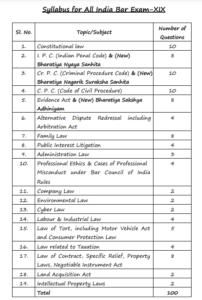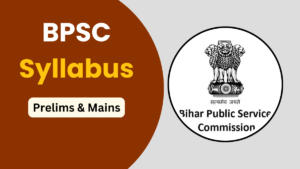Table of Contents
The Bar Council of India (BCI) published the AIBE 19 Syllabus for the All India Bar Examination (AIBE) 2024 on the official site. AIBE 19 Exam Date is rescheduled for 22 December 2024. To qualify for the AIBE 19 exam, candidates must carefully review the syllabus. This article provides the detailed syllabus along with preparation tips. The exam includes 100 multiple-choice questions with no negative marking, testing candidates’ legal knowledge and understanding.
AIBE 19 Syllabus 2024
Candidates should review the AIBE 19 syllabus to plan their study schedule and focus on important topics.. Candidates have the flexibility to attempt the exam in any of the 25 languages provided, including Hindi, English, Gujarati, Konkani, Nepali, Urdu, Dogri, Telugu, Tamil, Punjabi, Kashmiri, Oriya, Bodo, Assamese, Kannada, Odia, Malayalam, Sanskrit, Santhali, Bengali, Marathi, Kannada, Manipuri, Sindhi, and Maithili. Check the table provided below for the AIBE 19 Syllabus:
| AIBE 19 Overview 2024 | |
| Name of Organization | Bar Council of India (BCI) |
| Exam Name | AIBE 19 Exam 2024 |
| Full Name | All India Bar Examination (AIBE) |
| Exam Frequency | Twice a year |
| AIBE 19 Exam Date | 22 December 2024 |
| Exam Mode |
Offline (Pen-Paper based OMR Test)
|
| Official Website |
http://www.allindiabarexamination.com/
|
AIBE 19 Exam Pattern 2024
| AIBE 19 Exam Pattern 2024 | |
| Exam mode | Paper-Based Test |
| Exam duration | 3 hours 30 minutes |
| Test medium | 11 languages |
| Subjects | 19 law subjects |
| Admit Card | 15 December 2024 |
| Exam Date | 22 December 2024 |
| Total Questions | 100 questions |
| Type of questions | MCQs |
| Marking Scheme |
+1 for every correct Answer,
no negative marking
|
Syllabus of AIBE 19 – Topic Wise
All India Bar Council has numerous topics for the AIBE 19 Syllabus, Candidates who want to pass out AIBE 19 examination in 2024 have to complete this topic. In the below table, we have added all the topics for preparation.
| Topic |
Sub-topics Covered
|
| 1. Constitutional Law |
|
| 2. Indian Penal Code (IPC) |
|
| 3. Criminal Procedure Code (CrPC) |
|
| 4. Code of Civil Procedure (CPC) |
|
| 5. Evidence Act |
|
| 6. Alternative Dispute Redressal, including Arbitration Act |
|
| 7. Family Law |
|
| 8. Public Interest Litigation |
|
| 9. Administrative Law |
|
| 10. Professional Ethics & Cases of Professional Misconduct under BCI rules |
|
| 11. Company Law |
|
| 12. Environmental Law |
|
| 13. Cyber Law |
|
| 14. Labour & Industrial Laws |
|
| 15. Law of Tort, including the Motor Vehicle Act and Consumer Protection Law |
|
| 16. Law related to Taxation |
|
| 17. Land Acquisition Act |
|
| 18. Intellectual Property Laws |
|
| 19. Law of Contract, Specific Relief, Property Laws, Negotiable Instrument Act |
|
Syllabus of AIBE 19 – Subject Weightage
Important Topics in AIBE 19 Syllabus
Aspirants should check and revise regularly these topics, Below are the important topics for AIBE 19 for the year 2024.
| Important AIBE 2024 Bare Acts |
Candidates preparing for the bar examination should focus on the following Bare Acts
|
Preparation Tips for AIBE 19
Here are some effective preparation tips for the AIBE 19 exam, follow these steps to boost your preparation.
- Create and stick to a study schedule.
- Check the syllabus and exam pattern.
- Note down important points for easier revision.
- Check out the AIBE 19 Previous year Questions
- Focus more on high-weightage topics rather than spending too much time on low-weightage ones.
- Complete easier subjects first before tackling difficult ones.
- Develop Reasoning and Analytical skills which will benefit you both in the exam and in your legal career.
AIBE 19 Exam 2024 Marking Scheme
In the AIBE 19 Exam 2024, candidates get one mark for each correct answer. No Marks will be deducted for incorrect or unattempted answers, allowing candidates to answer without the fear of losing marks for wrong responses.
| AIBE Marking Parameters | Marks Awarded |
| Correct Answer | 1 |
| Incorrect Answer | 0 |
| Un-attempted Questions | 0 |
| Total Marks | 100 marks |
AIBE 19 Syllabus Important Books
These are the important books for AIBE 19. Follow these standard books to score well and increase your chances of getting a top rank in the first counseling
| AIBE 19 Important books | |
|---|---|
| Criminal Manual | Universal’s |
| Other Bare Acts | Universal Law Publishing Co Pvt Ltd |
| Constitution of India | Durga Das Basu |
| Labour and Industrial Laws | S.N. Mishra |
| Public Interest Litigation | Mamta Rao |
| Professional Ethics | Ram Jethmalani |
| Law of Contract | Avatar Singh |
| Indian Evidence Act | Batuk Lal |
| Law of Torts | R.K. Bangia |
| Family Law | Paras Diwan |
| Company Law and Practice | AK Majumdar/Dr. GK Kapoor |
| Civil Procedure with Limitation Act | CK Takwani |
| Environmental Law | S.C. Shastri |
| Cyber Law | Pavan Duggal |
| AIBE 19 Syllabus 2024 | |
| AIBE 19 Previous Year Question Paper | AIBE 19 Cut Off 2023 |




 APSC Syllabus 2025, Download Prelims And...
APSC Syllabus 2025, Download Prelims And...
 Punjab PCS Syllabus 2025, New Prelims an...
Punjab PCS Syllabus 2025, New Prelims an...
 BPSC Syllabus 2025 and Exam Pattern For ...
BPSC Syllabus 2025 and Exam Pattern For ...
